1.Arriving in the Lion City: Unveiling the Secrets of the Garden City Singapore's Changi Airport left a profound impression on me with its modernity and efficiency. Gone were the tedious procedures; instead, there were two swift electronic gates-one for passport verification, the other for facial recognition and fingerprint scanning. Since I arrived alone ahead of the group, I was understandably unfamiliar with the geography of the city. However, the airport staff, with their excellent hospitality, were more than willing to guide me without any hesitation, despite my lack of shopping intent. Moreover, their fluency in Mandarin was far superior to my English (which was a source of amusement for me, haha). If I hadn’t come to the garden how could I have ever known how beautiful spring was From the moment our plane touched down in Singapore, I felt as if I had unwittingly opened a door to a new world. Navigating through the streets of this “Garden City”, I could immediately sense the harmonious fusion of nature and urban life. The air was warm yet fresh, devoid of the oppressive humidity that often defines tropical climates. The roads between the airport and the city center underscored the city’s reputation, with well-maintained streets lined by verdant trees. Towering skyscrapers blended seamlessly with quaint alleyways, where modernity met tradition in a perfect dance of quiet vibrancy. Singapore's exceptional urban planning and environmental conservation were evident in every corner, which left me eager to explore the rest of my itinerary.
2.National University of Singapore: An Initial Encounter with Academia Stepping onto the campus of the National University of Singapore (NUS), I felt as though I had entered a grand garden where nature and academia coexisted harmoniously. Massive trees provided generous shade, and well-maintained lawns stretched across the campus, dotted with sleek, modern academic buildings, libraries, and research centers. During this visit, I attended an innovative entrepreneurship course led by Professor Anna, a lifetime professor at the university. The course was dynamic, engaging, and cutting-edge, with Anna’s academic expertise matched by her skill in guiding students to delve deeply into discussion. Her classes were a feast of knowledge, fostering lively debates among students from diverse cultural backgrounds, which often sparked profound insights. The appeal of international education was evident here. It broke the boundaries of conventional teaching methods, encouraging students to view problems from various perspectives. What stood out for me was how Professor Anna intertwined classic business case studies with statistical data, providing a comprehensive understanding of business models and innovation. The classroom atmosphere was excellent; despite the course being entirely in English, most students participated enthusiastically, a feat that made me reflect on the real-world use of English, as this provided me with a rare opportunity to practice speaking and listening. An interesting personal experience occurred when I found myself often switching between English and Mandarin during conversations with Singaporeans. This led me to ponder the nuances of communication: is perfect grammar always essential, or can the essence of the message be conveyed with simpler terms? This was especially apparent when speaking with locals from different linguistic backgrounds—some with accents and pronunciations that made communication a bit more challenging. In contrast, a few basic words and gestures could often lead to much more effective conversations.
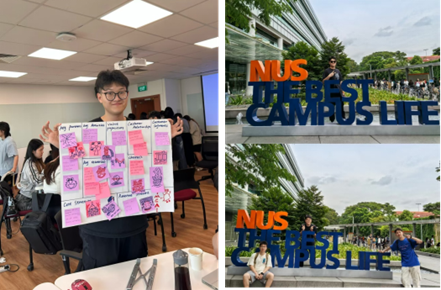
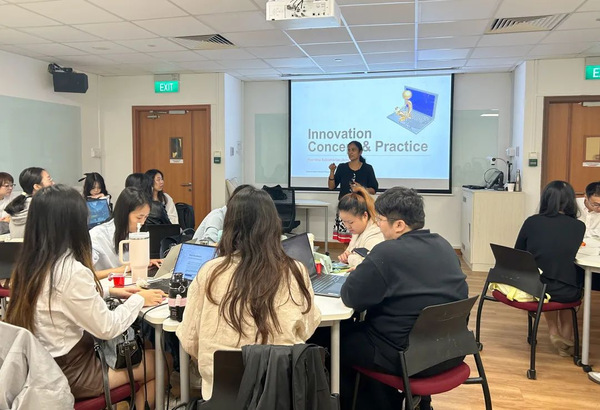
3.The Allure of NUS: Academic Atmosphere and Campus Environment The beauty of the NUS campus is only matched by the strong academic spirit that pervades every corner. The ancient buildings, adorned with ivy, seem to tell stories of the university’s rich history, while modern facilities—equipped with cutting-edge labs and classrooms—serve as a testament to the school’s forward-thinking approach to education. As I walked through the campus, I frequently saw students gathered on lawns, engaged in deep discussions, or reading intently in outdoor spaces near the libraries. Beneath a clear sky, the warm sunshine bathed the campus, where the vibrancy of youth and academic focus were palpable. Honestly, such an academic atmosphere is rare in many universities back home. I observed how students in the engineering and science departments, even when near a noisy poolside, would focus intensely on their work, whether assembling circuit boards or running experiments. The contrast was striking—students in NUS appeared to be more immersed in their academic pursuits, unfazed by the surrounding distractions. I admired this commitment to focus, which made me reflect on my own preferences for a quiet and undisturbed study environment.
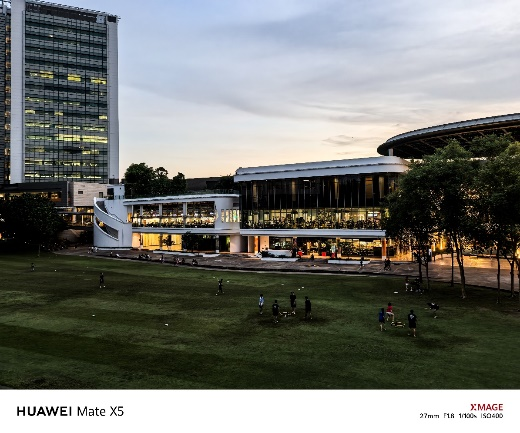 
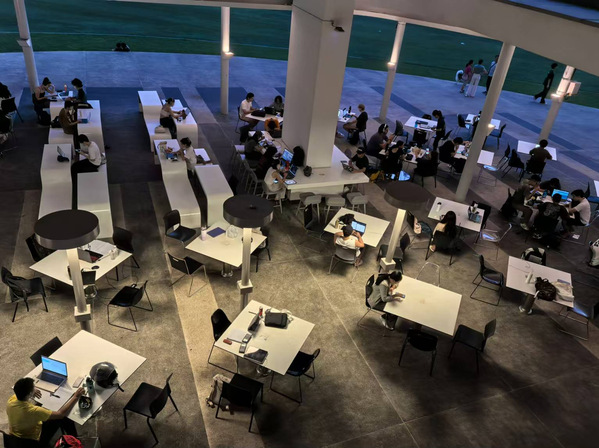
The image above, taken in the outdoor public seating area of Utown, exemplifies this phenomenon. Despite the noise and insufficient lighting, NUS students seemed unfazed, making this less-than-ideal space their academic sanctuary. This level of concentration is truly admirable.
4.Nanyang Technological University: A Fusion of Technology and Humanities After leaving NUS, I visited Nanyang Technological University (NTU), and once again, I was struck by the distinctiveness of its campus. The architecture here was an exhibition of art and engineering, exemplified by the famous Soup Dumpling teaching center, a striking structure that blends technology with artistic flair. The campus is laced with serene lakes and surrounded by vibrant flora, creating an elegant, tranquil environment. What stood out most during my visit was the campus’s unique system of floor numbering. For example, in the Soup Dumpling building, what I assumed was the ground floor was labeled B5—indicating it was actually five floors below ground level. This uniformity in floor numbering across the entire campus was a testament to the university’s strict adherence to systematized order. 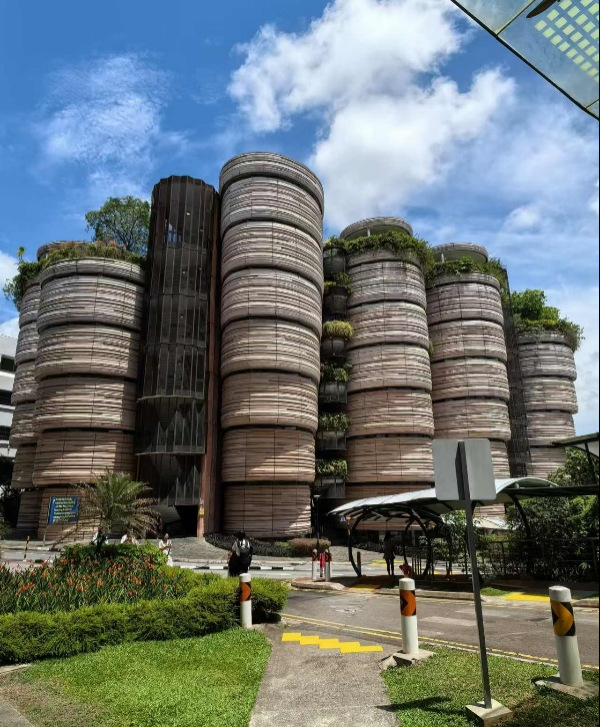
Regarding the academic atmosphere, Nanyang Technological University (NTU) is equally outstanding. The university actively encourages innovation and interdisciplinary research, with frequent collaborative projects between different departments. Here, you can truly sense a spirit of positivity and a thirst for exploration. Whether it's the busy researchers in the labs or the students deeply immersed in their studies in classrooms, everyone is striving towards the pursuit of knowledge. The academic atmosphere at NTU differs significantly from that at NUS. Most students here have a strong engineering and technical background. For example, I noticed that even for a video production assignment, they hired a highly professional team and used top-tier equipment for the shoot. Another valuable experience for me was the in-depth exchange with two of my childhood friends, who are currently studying at NTU. Both of them were top students in China’s educational system, the kind of “ideal children” we often hear about. However, their paths at NTU have been quite different. One of them, Student A, is enrolled in a standard computer science program. He enjoys his studies immensely, regularly participates in global computer science competitions to broaden his knowledge, and also engages in extracurricular activities in his spare time. Overall, Student A’s graduate life is fulfilling and joyful. On the other hand, Student B enrolled in a direct Ph.D. program, a path similar to the ones offered in China. He first works as a teaching assistant for a year before moving directly into the Ph.D. track. Student B also receives a stipend of around 4,000 SGD per month. Both of my friends have many qualities that I admire and seek to learn from. Through my conversations with them, I felt a distinct sense of difference between us. They have a very strong sense of control over their academic goals and life paths. Both are relentlessly pursuing the lives they envision for themselves, and I find this determination highly inspiring.
5.Personal Reflections and Insights My experiences at both NUS and NTU have profoundly reshaped my understanding of international higher education. Both institutions boast world-class academic resources and a strong intellectual ethos, yet they each have their own unique appeal. NUS excels with its comprehensive academic offerings and historical heritage, particularly in the fields of humanities, social sciences, and natural sciences. In contrast, NTU shines in its emphasis on innovation and technology, producing highly skilled professionals with a strong practical orientation. The campus environments at both universities are not only beautiful but serve as vital incubators for academic creativity. A well-designed space can inspire enthusiasm for learning, foster creativity, and help propagate knowledge. The shared experience at these universities reinforced for me that education is more than just the transmission of knowledge—it's about developing well-rounded individuals with critical thinking skills, teamwork abilities, and innovative minds. This trip to Singapore has been a valuable experience in my academic journey, and it continues to motivate me as I pursue my own path forward in higher education.
Written by Yuan Heng November 12, 2024 |

